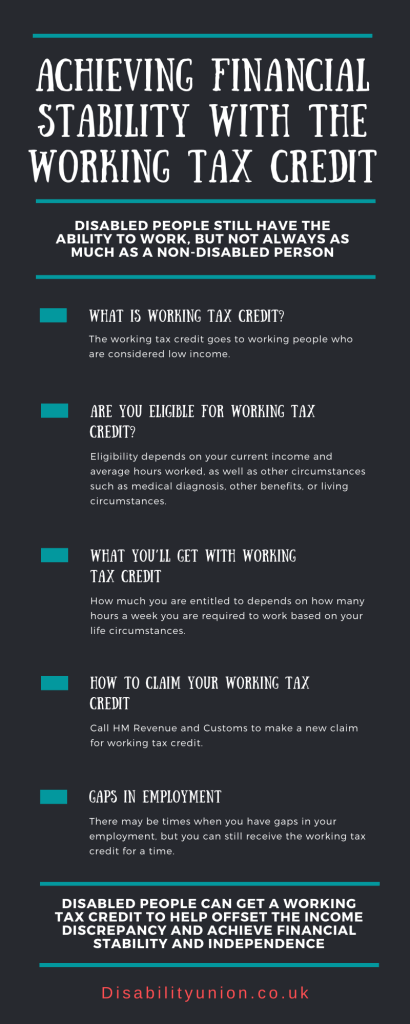
Disabled people still have the ability to work, but not always as much as a non-disabled person. This could be due to lack of access, lack of stamina, or the threat of losing benefits for earning too much. Working limited hours means limited pay, which means disabled people often are low-income. Being low income makes it harder to live, even before adding on the extra costs of things like medical supplies, which come along with being disabled. Did you know disabled people can get a working tax credit to help offset the income discrepancy? In this article, we’re going to discuss the working tax credit, who qualifies, and how to claim it. For more information, and to sign up for it, you can click here.
What is Working Tax Credit?
Simply put, the working tax credit is similar to any other tax credit in that it is a payout from the government to those who qualify. In this instance, the working tax credit goes to working people who are considered low income. Important to note is that this money will count as income when determining any other means-tested benefits.
Are You Eligible?
Like other benefits we’ve discussed here, your eligibility for the working tax credit is not guaranteed. Not everyone is eligible. Eligibility is contingent on your current income and average hours worked, as well as other circumstances. These may be medical diagnosis, other benefits, or living circumstances.
Universal tax credit has replaced the working tax credit for some people. You are only eligible for the working tax credit if you get/are eligible for the severe disability premium, or got it within the last month. If this doesn’t apply to you and you aren’t already receiving the working tax credit, you may need to look at the universal tax credit as an alternative.
What You’ll Get
How much you are entitled to depends on your life circumstances. Simply put, you must work a certain number of hours a week to qualify. The number of hours depends on your age, your ability to work, if you are married, and whether or not you have kids. For example, a 25 year-old non-disabled person would be required to work at least 30 hours a week, while someone of the same age would only be required to work 16. To figure out what you’ll get and if you qualify, you can use this tax credits calculator.
How to Claim it
So you have determined that you qualify for the working tax credit, not the universal credit, and are ready to make a claim. To do this, call HM Revenue and Customs to make a new claim for working tax credit. Like all other benefit-services, it can take time to get your claim processed. Usually, it can take up to 5 weeks to process your claim. You can start a claim at any point after starting a job, regardless of the time of year, so there’s no reason to wait.
When you start a claim, you may be asked for any of the following:
- your National Insurance number (if you have one)
- your income for the last tax year
- details of any benefits you get
- details of any childcare payments
- the number of hours you work per week
Have these details handy so the claim can be processed as smoothly and quickly as possible.
Gaps in Employment
There may be times when you have gaps in your employment. Maybe you get sick, maybe you lose your job, maybe you go on maternity leave. There are a number of reasons you could not receive a paycheck for a time. In cases such as these, you can still receive the working tax credit for a time. The duration will vary depending on circumstances, so check here for a more in-depth look.
There are many factors that lead to disabled people being able to live independent lives, and financial stability is an important one. Disabled people are able to work, just maybe not always as much. Luckily, the working tax credit is one way disabled people can get a little extra help in achieving independence.


